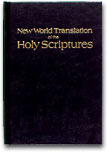
In the Daniel book regarding the king of the north and south it talks about the Maccabees and how significant it was that Judas Maccabee restored the temple for "Jehovah" and establish Hanukkah. If this was a victory for Jehovah and so significant in biblehistory, then why don't JW's recognize it for what its worth?
Since the extra-biblical incident is mentioned in the Watchtower Society’s commentary on Daniel it is apparent that Jehovah’s Witnesses do recognize it as genuine Jewish history.
_
Dear Sir, I have no doubt in my mind that Jehovah is God's personal name, and I know it appears almost 7,000 times in the Old Testament, now my question is. Being that God's personal name is so important, why would he allow his holy name to be removed from the new testament, no doubt Jesus called him Jehovah, but in the oldest copies of the Greek scriptures we have his name had already been removed, why would he allow that?
Not only did he allow his name to be removed from the oldest copies of the Greek Scriptures, but he continues to allow modern translators to remove his name from the entire Bible. Jesus once said that there is nothing that is carefully hidden except for the purpose of revealing. In a sense God has allowed his name to be hidden. However, Jehovah has also seen to it that his name be restored to the Scriptures and its significance revealed to those who want to know the truth, which is the work Jehovah’s Witnesses have accomplished in recent decades. And who knows, perhaps at some point ancient New Testament scrolls might be unearthed that contain the divine name.
_
How do we reconcile what Ezra told the people to do with their foreign wives with the fact that Rahab (the Canaanite) was a part of Jesus family line? They brought it out at our meeting that Ezra told them to do this because of keeping the lines to the Messiah pure.
Rahab, the Canaanite prostitute, is specifically named as an outstanding example of faith. Even though she was not in any way connected to the Israelites, she put her faith and trust in the God of the Israelites. In effect, she converted –becoming a proselyte. And as such she was entitled to be recognized as having an equal standing in the nation, which included marital rights. Same situation with Ruth, the Moabitess; she also converted to the worship of Jehovah and became an ancestress of Jesus.
The situation that arose in Ezra’s day was different. Evidently it had become a common practice for Hebrew men to marry foreign women, which was a flagrant violation of the Mosaic Law. And there is no indication that those foreign women became Jewish proselytes before they became wives to Jewish husbands, as was the case with Rahab and Ruth.



No comments:
Post a Comment